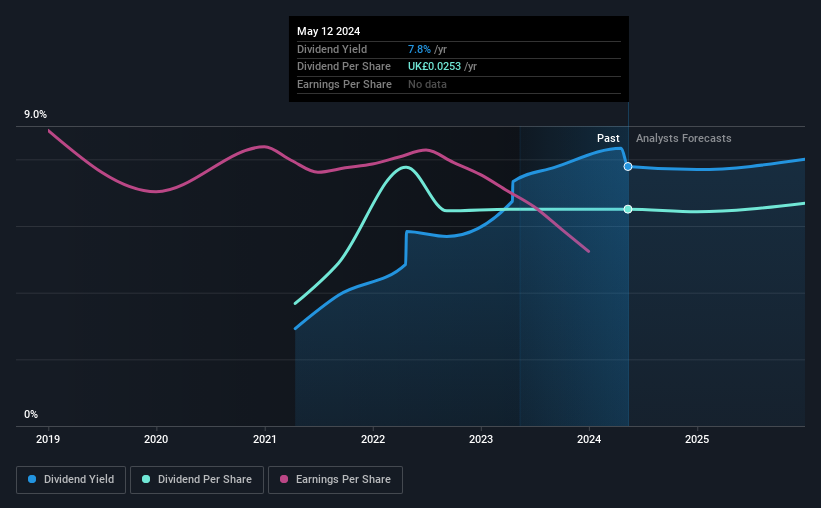It Might Not Be A Great Idea To Buy Vector Capital Plc (LON:VCAP) For Its Next Dividend
Regular readers will know that we love our dividends at Simply Wall St, which is why it's exciting to see Vector Capital Plc (LON:VCAP) is about to trade ex-dividend in the next 3 days. The ex-dividend date is one business day before a company's record date, which is the date on which the company determines which shareholders are entitled to receive a dividend. The ex-dividend date is important because any transaction on a stock needs to have been settled before the record date in order to be eligible for a dividend. This means that investors who purchase Vector Capital's shares on or after the 16th of May will not receive the dividend, which will be paid on the 3rd of June.
The company's next dividend payment will be UK£0.0153 per share, on the back of last year when the company paid a total of UK£0.025 to shareholders. Based on the last year's worth of payments, Vector Capital stock has a trailing yield of around 7.8% on the current share price of UK£0.325. Dividends are a major contributor to investment returns for long term holders, but only if the dividend continues to be paid. We need to see whether the dividend is covered by earnings and if it's growing.
See our latest analysis for Vector Capital
If a company pays out more in dividends than it earned, then the dividend might become unsustainable - hardly an ideal situation. Vector Capital is paying out an acceptable 72% of its profit, a common payout level among most companies. Vector Capital paid a dividend despite reporting negative free cash flow last year. That's typically a bad combination and - if this were more than a one-off - not sustainable.
Generally speaking, the lower a company's payout ratios, the more resilient its dividend usually is.
Click here to see how much of its profit Vector Capital paid out over the last 12 months.
Have Earnings And Dividends Been Growing?
When earnings decline, dividend companies become much harder to analyse and own safely. If earnings decline and the company is forced to cut its dividend, investors could watch the value of their investment go up in smoke. Readers will understand then, why we're concerned to see Vector Capital's earnings per share have dropped 10% a year over the past five years. When earnings per share fall, the maximum amount of dividends that can be paid also falls.
Many investors will assess a company's dividend performance by evaluating how much the dividend payments have changed over time. In the last three years, Vector Capital has lifted its dividend by approximately 21% a year on average. That's interesting, but the combination of a growing dividend despite declining earnings can typically only be achieved by paying out more of the company's profits. This can be valuable for shareholders, but it can't go on forever.
The Bottom Line
Should investors buy Vector Capital for the upcoming dividend? We're not overly enthused to see Vector Capital's earnings in retreat at the same time as the company is paying out more than half of its earnings as dividends to shareholders. All things considered, we're not optimistic about its dividend prospects, and would be inclined to leave it on the shelf for now.
Although, if you're still interested in Vector Capital and want to know more, you'll find it very useful to know what risks this stock faces. We've identified 3 warning signs with Vector Capital (at least 1 which doesn't sit too well with us), and understanding them should be part of your investment process.
A common investing mistake is buying the first interesting stock you see. Here you can find a full list of high-yield dividend stocks.
Have feedback on this article? Concerned about the content? Get in touch with us directly. Alternatively, email editorial-team (at) simplywallst.com.
This article by Simply Wall St is general in nature. We provide commentary based on historical data and analyst forecasts only using an unbiased methodology and our articles are not intended to be financial advice. It does not constitute a recommendation to buy or sell any stock, and does not take account of your objectives, or your financial situation. We aim to bring you long-term focused analysis driven by fundamental data. Note that our analysis may not factor in the latest price-sensitive company announcements or qualitative material. Simply Wall St has no position in any stocks mentioned.

 Yahoo Finance
Yahoo Finance 
